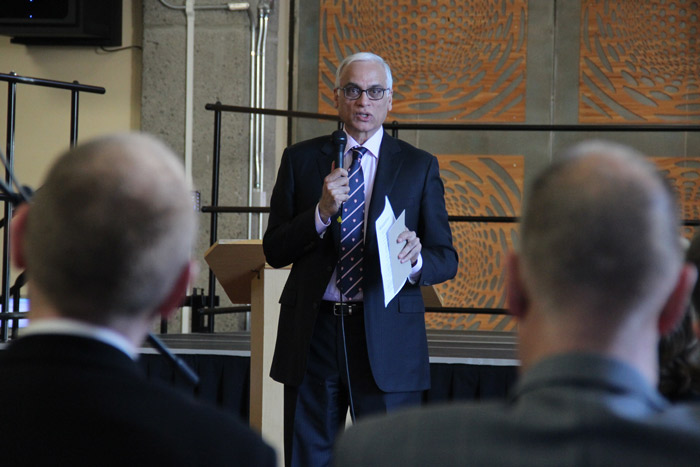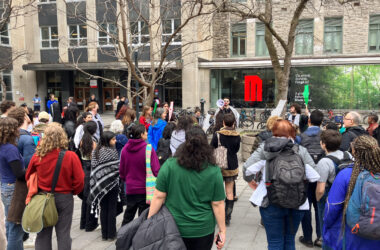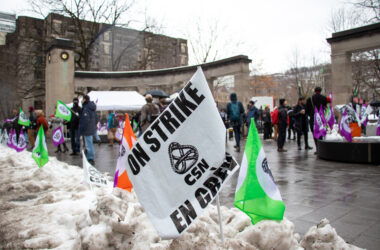On March 8, the Students’ Society of McGill University (SSMU) and the Post-Graduate Students’ Society (PGSS) hosted the McGill Student and Board of Governors Open Forum. The event consisted of overviews of the Board of Governors (BoG), the highest governing body at McGill, presented by Board members Kip Cobbett, Sam Minzberg, Cynthia Price, and Ram Panda. Afterward, members from Divest McGill expressed concerns about McGill’s investment in fossil fuels, and the Peer Support Centre discussed the centre’s growth statistics. Nightline and CKUT also introduced ongoing club efforts to launch an online mental health chat function and a podcast on student research, while Brainreach North presented its initiative to create supplementary scientific educational materials for schools in remote and Northern Indigenous communities.
This is the fourth open forum between student groups and the BoG, with the last forum held in 2016. Ger commended these type of meetings for engaging students and creating a better relationship with the BoG.
“Having Board members see exactly how much students contribute to the community, I think, will make […] processes at the Board level more reflective of what’s needed on the ground,” Ger said. “It will make governors more appreciative of the amount of work and money the students put into the administration and the school as a whole, beyond their tuition and taxes.”
Divest McGill
Since 2012, Divest McGill has lobbied the university to divest its endowment from fossil-fuel related companies and to reinvest in more environmentally responsible alternatives. According to BoG Chair Kip Cobbett, McGill plans to address climate change by reducing the school’s carbon footprint.
“We have committed $10 million dollars to climate research,” Cobbett said. “[….] Our view is that McGill can address climate change much better by doing things to reduce its own emissions and to conduct research on how to move away from fossil fuels to more sustainable fuels.”
According to Divest McGill Organizer Julia Bugiel, U3 Arts, McGill is not doing enough, despite Cobbett’s statements.
“On the one hand, McGill parades itself as a sustainability leader,” Bugiel said. “On the other hand, McGill’s [choice to fund] the opposition is betting against people who are part of that fight. Is McGill going to be a sustainability leader or a climate profiteer? We cannot be both.”
Although Cobbett presented alternative sustainability methods alternative from divestment, Ger expressed his support for Divest McGill.
“I am grateful for the amount of energy that Divest continues to put into their advocacy work to push the university in the right direction,” Ger said. “I am still hopeful that the university will move towards a divestment strategy in the near future.”
Peer Support Centre
In Fall 2016, the Peer Support Centre (PSC) opened a permanent space in the SSMU building and extended its drop-in hours starting Winter 2017. Since its launch in Winter 2014, the PSC has provided free one-on-one and confidential peer support and resource referral to all McGill students.
According to David Benrimoh, PSC program evaluation coordinator, the PSC has expanded considerably by partnering with SSMU.
“[The PSC has] come quite a way,” Benrimoh said. “In 2014-2015, we had 25 visits total over the whole year. Then, 30 visits the next year. This year, we’ve jumped 500 per cent to 270 visits over the year, and we’re really on track to seeing over 300 students this year.”
Billy Liu, PSC finance coordinator, explained that the increase in student visits is due to a combination of the recent changes to the structure of mental health support at the McGill Counselling and Mental Health Services (MCMHS), as well as the PSC’s operation.
“[At MCMHS, students] could end up waiting months, or even a semester, before they even see that initial psychotherapist,” Liu said. “[….] What we already know is that there is this heavy burden on [MCMHS], but I think what we can owe to the growth and transition of our service over the past year is that we now we have a permanent accessible space and have consistent hours.”
A previous version of this article incorrectly stated that Board of Governors (BoG) member Sam Minzberg’s last name was Minsberg. Additionally, the article incorrectly stated that BoG members are part of the McGill administration. Finally, the article incorrectly stated that a forum between the BoG and students had not been held in the last three years. In fact, this event was the fourth such meeting and the last one occurred last year. The McGill Tribune regrets these errors.









